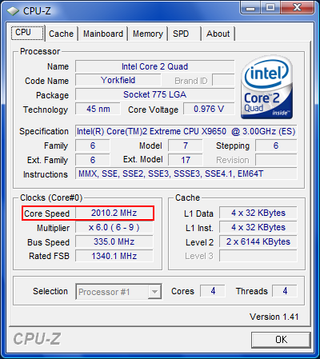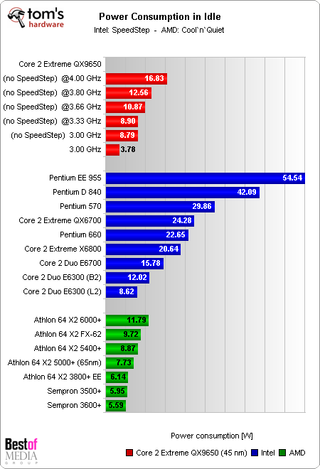Intel's 45 nm Penryn CPU: 4 GHz Air Cooled
Sensational: Idle Power Consumption Of Only 3.79 Watts
We were amazed - in fact, couldn't believe our eyes - when we first measured the power consumption of the QX9650. We repeated our measurements several times to ensure their veracity and rule out errors on our part, but we kept coming up with the same result. In idle mode, with the CPU's four cores running at a reduced frequency of 2 GHz thanks to Intel's Speedstep technology, the meter only indicated 310 milliamperes. The system voltage lay at 12.216 Volts, which means that our 45 nm Penryn has a sensationally low power consumption of only 3.79 Watts.

The relatively high processor clock speed of 2.0 GHz even when idle is a result of the high FSB speed of 333 MHz (1333 QDR) coupled with the smallest available multiplier of 6x. With Speedstep active, the core voltage was only 0.998 V.

Here, the new gate material in the processor's MOSFET transistors impressively demonstrates its low power draw. It allows Intel's current flagship model to undercut AMD's most frugal processor with energy saving features enabled. The trouble for AMD is that its processor with the lowest power consumption is a Sempron, which certainly isn't in the same league as our Core 2 Extreme CPU. On the other hand, bear in mind that AMD's CPUs include the memory controller on the CPU, which reduces the power consumption of the northbridge.
The Penryn processor is able to signal the motherboard when it is idling. The motherboard can then switch off parts of the voltage plane in order to conserve power further.
Still, we should also consider the overall power consumption of the two platforms. In this respect, Intel still loses out to AMD. While Intel's X38 chipset is specified with a TDP of 36.5 W, AMD's offerings have no trouble staying far below that.
Stay on the Cutting Edge
Join the experts who read Tom's Hardware for the inside track on enthusiast PC tech news — and have for over 25 years. We'll send breaking news and in-depth reviews of CPUs, GPUs, AI, maker hardware and more straight to your inbox.
Current page: Sensational: Idle Power Consumption Of Only 3.79 Watts
Prev Page Overclocking To 4.0 GHz - FSB1600 Offers No Advantage Next Page Very Good - 73 Watts For Four CoresTom's Hardware's dedicated news crew consists of both freelancers and staff with decades of experience reporting on the latest developments in CPUs, GPUs, super computing, Raspberry Pis and more.
Most Popular


